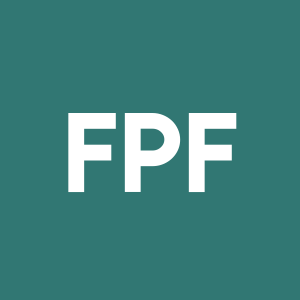First Trust Intermediate Duration Preferred & Income Fund Declares Its Monthly Common Share Distribution of $0.1275 Per Share for June
First Trust Intermediate Duration Preferred & Income Fund (the "Fund") (NYSE: FPF) has declared the Fund’s regularly scheduled monthly common share distribution in the amount of
First Trust Intermediate Duration Preferred & Income Fund (FPF): |
||
Distribution per share: |
|
|
Distribution Rate based on the May 19, 2021 NAV of |
|
|
Distribution Rate based on the May 19, 2021 closing market price of |
|
|
The majority, and possibly all, of this distribution will be paid out of net investment income earned by the Fund. A portion of this distribution may come from net short-term realized capital gains or return of capital. The final determination of the source and tax status of all 2021 distributions will be made after the end of 2021 and will be provided on Form 1099-DIV.
The Fund is a diversified, closed-end management investment company that seeks to provide a high level of current income. The Fund has a secondary objective of capital appreciation. The Fund will seek to achieve its investment objectives by investing in preferred and other income-producing securities. Under normal market conditions, the Fund will invest at least
First Trust Advisors L.P. ("FTA") is a federally registered investment advisor and serves as the Fund's investment advisor. FTA and its affiliate First Trust Portfolios L.P. ("FTP"), a FINRA registered broker-dealer, are privately-held companies that provide a variety of investment services. FTA has collective assets under management or supervision of approximately
Stonebridge Advisors LLC ("Stonebridge"), the Fund's investment sub-advisor, is a registered investment advisor specializing in preferred and hybrid securities. Stonebridge was formed in December 2004 by First Trust Portfolios L.P. and Stonebridge Asset Management, LLC. The company had assets under management or supervision of approximately
Past performance is no assurance of future results. Investment return and market value of an investment in the Fund will fluctuate. Shares, when sold, may be worth more or less than their original cost. There can be no assurance that the Fund’s investment objectives will be achieved. The Fund may not be appropriate for all investors.
Principal Risk Factors: Securities held by a fund, as well as shares of a fund itself, are subject to market fluctuations caused by factors such as general economic conditions, political events, regulatory or market developments, changes in interest rates and perceived trends in securities prices. Shares of a fund could decline in value or underperform other investments as a result of the risk of loss associated with these market fluctuations. In addition, local, regional or global events such as war, acts of terrorism, spread of infectious diseases or other public health issues, recessions, or other events could have a significant negative impact on a fund and its investments. Such events may affect certain geographic regions, countries, sectors and industries more significantly than others. The outbreak of the respiratory disease designated as COVID-19 in December 2019 has caused significant volatility and declines in global financial markets, which have caused losses for investors. The COVID-19 pandemic may last for an extended period of time and will continue to impact the economy for the foreseeable future.
Preferred/hybrid and debt securities in which the Fund invests are subject to various risks, including credit risk, interest rate risk, and call risk. Credit risk is the risk that an issuer of a security will be unable or unwilling to make dividend, interest and/or principal payments when due and that the value of a security may decline as a result. Credit risk may be heightened for the Fund because it invests in below investment grade securities, which involve greater risks than investment grade securities, including the possibility of dividend or interest deferral, default or bankruptcy. Interest rate risk is the risk that the value of fixed-rate securities in the Fund will decline because of rising market interest rates. Call risk is the risk that performance could be adversely impacted if an issuer calls higher-yielding debt instruments held by the Fund. These securities are also subject to issuer risk, floating rate and fixed-to-floating rate risk, prepayment risk, reinvestment risk, subordination risk and liquidity risk.
The risks associated with trust preferred securities typically include the financial condition of the financial institution that creates the trust, as the trust typically has no business operations other than holding the subordinated debt issued by the financial institution and issuing the trust







